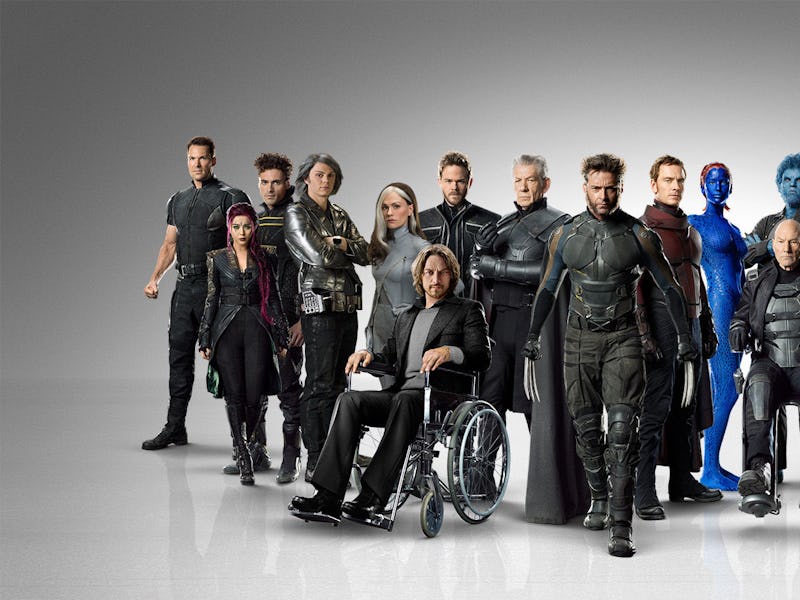Where Were the X-Men in Marvel's 'Civil War'?
The X-Men can't partake in Marvel Studios' super brawl, so what did they do in the original comic?

Superheroes of the Marvel Cinematic Universe engaged in a not-so-civil war in Joe and Anthony Russo’s Captain America: Civil War, the latest blockbuster success for parent company Disney. The movie invited a record number of superheroes to party brawl, including Spider-Man and Black Panther, in a single giant Hollywood movie. But after legal restrictions and licensing deals, not every hero could be invited. That included the X-Men.
Thanks to deals made before Disney bought Marvel, 20th Century Fox maintains a hold on the big-screen rights to Marvel’s mutants and one Merc with the Mouth; the studio is primed to release Bryan Singer’s X-Men: Apocalypse on May 27 (Early reviews say: It’s aight). The Russos’ Civil War is only loosely based on the original Marvel comic penned by Mark Millar, but that crossover did have room for the X-Men. So what were they doing during Civil War?
First, it’s important to understand how different the story in comic Civil War was. Published in 2006, Civil War centered on superhero governance that was less about accountability and more about McCarthy-esque registration. It was a timely comment on the then-immediate post-9/11 paranoia and P.A.T.R.I.O.T. Act privacy invasion, even if in the end, it didn’t really say all that much. Additionally, in popular culture, celebrity reality TV achieved peak popularity.
Marvel fused the two: Z-list superheroes led by a goof named Speedball were filming, hoping to score ratings, and began picking a fight against super-villains on the lam. The fight goes nuclear, leveling a Connecticut suburb resulting in 600 civilians, 60 of them children, dead.
From Marvel's 'Civil War' #1
Should the Superhero Registration Act pass, superheroes would be forced to surrender their identities and undergo federally-mandated training. Iron Man was reluctantly for it. Captain America, who fought in World War II and saw first-hand what registration looks like, wanted none of it. That’s when the fighting begins.
From Marvel's 'Civil War' #1
Captain America wasn’t the only one against the idea. When Stan Lee and Jack Kirby created X-Men in 1963, it was the height the Civil Rights Movement, and the comic reflected that; the Marvel duo created the X-Men as a comic metaphor for minorities and LGBTQ communities. In the 1980s, as the real world panicked from the AIDS virus, the X-Men came under scrutiny and in Uncanny X-Men #181 written by Chris Claremont, the bespectacled Robert Kelly introduces the Mutant Registration Act. It passes in issue #183 in July 1984. How fitting.
As you’d expect, mutants were downright pissed when the idea arrived for everyone in 2006. Sick of discrimination and still not recovered from the devastating reduction of the mutant population in House of M (Long story short: Scarlet Witch went nuts), Cyclops speaks for all the X-Men when they declare public neutrality in the debate. It’s largely implied they would have gladly fought for Cap, but mutants were in the public’s doghouse already when Connecticut is blown up. Civil War just made things worse. But while the X-Men are officially neutral, Wolverine and Storm get caught up and wind up fighting for Cap’s side.
'Civil War: X-Men' #1 by David Hine and Yanick Paquette
Civil War: X-Men ran for four issues during the main, overarching Civil War storyline and was written by David Hine. In it, the 198-known mutants are broken out of the Xavier Institute — turned into a nightmarish internment camp patrolled by Sentinels — by X-Force’s Domino, Shatterstar, and Caliban. Bishop, who was pro-registration, obtains permission from the government to find the 198 mutants. Cyclops and what’s left of the original X-Men go off to find them first before Bishop can.
In the end, after ample chasing and fighting, a compromise is reached. The Xavier Institute becomes less an involuntary camp and more a voluntary community with freedom to come and go, while the Sentinels remain for “protection.” However shaky the compromise seems, it’s a start.
While it’s a bummer that superheroes like Wolverine or Storm couldn’t join the rumble, it’s not like many of them were involved in Civil War to begin with. They had their own issues then, and they have their own issues now. They’re fighting the apocalypse, after all.
X-Men: Apocalypse hits theaters May 27.